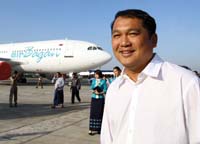Tracking the Tycoons
THREE years after profiling Burma’s most successful tycoons in its September 2005 issue, The Irrawaddy is again directing attention to the men who govern the country’s business world. They continue to prosper, and have been joined by others, yet they are coming increasingly under the international spotlight and critical scrutiny.
Many of those who featured in our September 2005 issue found themselves on another list last year—penalized by US and EU sanctions because of their relationship with, and unquestioning support for, Burma’s military regime.
The sanctions list contained such names as Tay Za and his elder brother, Thi Ha; Asia World’s director Tun Myint Naing; Aung Thet Mann, whose father is the regime’s third most powerful general; and Khin Shwe, who faithfully attended the regime-sponsored National Convention and is well connected to the top junta leaders.
They were penalized by the US shortly after the regime they so assiduously back brutally suppressed demonstrations last September demanding changes that would advance prosperity and freedom for all, not just a favored clique.
The US sanctions were also clamped on 25 top military generals and ministers who keep the tycoons in business—including the junta’s triumvirate of Snr-Gen Than Shwe, Vice Snr-Gen Maung Aye and Gen Thura Shwe Mann.
The targeted sanctions were applied under Washington’s Burmese Freedom and Democracy Act, which came into force in July 2003 after junta-backed thugs ambushed opposition leader Aung San Suu Kyi and her supporters in Depayin, Sagaing Division.
Although the list of military leaders, family members and their business cronies is long, many other names deserve to be added to it. There are also doubts whether the sanctions have a real effect on the privileged lifestyle of the generals and their business cronies. They continue to enjoy the good life while the masses live in poverty.
By naming these members of an uncaring caste, we hope to shame them. It won’t be the last list we’ll publish—the clique is growing, but so is international awareness of its members’ perfidious practices.
The Irrawaddy
Tay Za
Htoo Trading Company
 |
Tay Za (Photo: AFP) |
Tay Za’s connection to the regime is the key to his success. He is known to be close to Burma’s top leaders, including Snr-Gen Than Shwe and Gen Shwe Mann.
Than Shwe once stayed at Tay Za’s beach resort in Ngwe Saung and the senior general was reportedly impressed by his meeting with the young tycoon there. Since then, Tay Za has been offered more and more lucrative business concessions.
Tay Za, or Teza, is especially close to Gen Shwe Mann, who he has known since the general was regional commander in the Irrawaddy delta.
After setting up the Htoo Company in the early 1990s, Tay Za dramatically expanded his business empire by working closely with the military regime. Myanmar Avia Export Co Ltd, a company he created to supply the Burmese military with spare parts for its aircraft, is Burma’s sole representative of Russia’s Export Military Industrial Group, known as MAPO, and of the Russian helicopter company Rostvertol.
Because of his Russian connections, he was said to be instrumental in the junta’s purchase of advanced MiG-29 fighter-bombers and military helicopters. The company denied this, saying it helped to purchase only civilian helicopters for the regime.
Last year, Tay Za expanded his empire by entering the airline business with the launch of Air Bagan, which began its operations with domestic and regional routes.
Faced with US sanctions in October 2007, however, the airline suspended its flights to Singapore, citing the effects of the punitive measures.
Tay Za’s wife, Thida Zaw, and oldest son, Pye Phyo Tay Za, were also put on the sanctions list. His son’s lavish lifestyle in Singapore was exposed by pro-democracy blog sites, causing an outcry.
1 | 2 | 3 | 4 | 5 | 6 | 7 next page »
